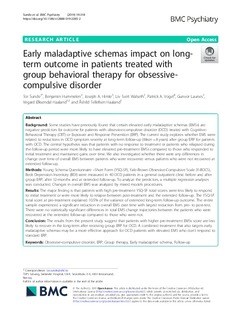| dc.contributor.author | Sunde, Tor | |
| dc.contributor.author | Hummelen, Benjamin | |
| dc.contributor.author | Himle, Joseph A. | |
| dc.contributor.author | Walseth, Liv Tveit | |
| dc.contributor.author | Vogel, Patrick A. | |
| dc.contributor.author | Launes, Gunvor | |
| dc.contributor.author | Haaland, Vegard Øksendal | |
| dc.contributor.author | Håland, Åshild Tellefsen | |
| dc.date.accessioned | 2020-02-14T07:26:00Z | |
| dc.date.available | 2020-02-14T07:26:00Z | |
| dc.date.created | 2019-10-30T10:27:37Z | |
| dc.date.issued | 2019 | |
| dc.identifier.citation | BMC Psychiatry. 2019, 19 (318) | nb_NO |
| dc.identifier.issn | 1471-244X | |
| dc.identifier.uri | http://hdl.handle.net/11250/2641653 | |
| dc.description.abstract | Background
Some studies have previously found that certain elevated early maladaptive schemas (EMSs) are negative predictors for outcome for patients with obsessive-compulsive disorder (OCD) treated with Cognitive-Behavioral Therapy (CBT) or Exposure and Response Prevention (ERP). The current study explores whether EMS were related to reductions in OCD symptom severity at long-term follow-up (Mean = 8 years) after group ERP for patients with OCD. The central hypothesis was that patients with no response to treatment or patients who relapsed during the follow-up period were more likely to have elevated pre-treatment EMSs compared to those who responded to initial treatment and maintained gains over time. We also investigated whether there were any differences in change over time of overall EMS between patients who were recovered versus patients who were not recovered at extended follow-up.
Methods
Young Schema Questionnaire –Short Form (YSQ-SF), Yale-Brown Obsessive-Compulsive Scale (Y-BOCS), Beck Depression Inventory (BDI) were measured in 40 OCD patients in a general outpatient clinic before and after group ERP, after 12-months and at extended follow-up. To analyze the predictors, a multiple regression analyses was conducted. Changes in overall EMS was analyzed by mixed models procedures.
Results
The major finding is that patients with high pre-treatment YSQ-SF total scores were less likely to respond to initial treatment or were more likely to relapse between post-treatment and the extended follow-up. The YSQ-SF total score at pre-treatment explained 10.5% of the variance of extended long-term follow-up outcome. The entire sample experienced a significant reduction in overall EMS over time with largest reduction from pre- to post-test. There were no statistically significant differences in total EMS change trajectories between the patients who were recovered at the extended follow-up compared to those who were not.
Conclusion
The results from the present study suggest that patients with higher pre-treatment EMSs score are less likely to recover in the long-term after receiving group ERP for OCD. A combined treatment that also targets early maladaptive schemas may be a more effective approach for OCD patients with elevated EMS who don’t respond to standard ERP. | nb_NO |
| dc.language.iso | eng | nb_NO |
| dc.publisher | BioMed Central | nb_NO |
| dc.rights | Navngivelse 4.0 Internasjonal | * |
| dc.rights.uri | http://creativecommons.org/licenses/by/4.0/deed.no | * |
| dc.title | Early maladaptive schemas impact on long-term outcome in patients treated with group behavioral therapy for obsessive-compulsive disorder | nb_NO |
| dc.type | Journal article | nb_NO |
| dc.type | Peer reviewed | nb_NO |
| dc.description.version | publishedVersion | nb_NO |
| dc.source.volume | 19 | nb_NO |
| dc.source.journal | BMC Psychiatry | nb_NO |
| dc.source.issue | 318 | nb_NO |
| dc.identifier.doi | 10.1186/s12888-019-2285-2 | |
| dc.identifier.cristin | 1742039 | |
| dc.description.localcode | Open Access This article is distributed under the terms of the Creative Commons Attribution 4.0 International License (http://creativecommons.org/licenses/by/4.0/), which permits unrestricted use, distribution, and reproduction in any medium, provided you give appropriate credit to the original author(s) and the source, provide a link to the Creative Commons license, and indicate if changes were made. The Creative Commons Public Domain Dedication waiver (http://creativecommons.org/publicdomain/zero/1.0/) applies to the data made available in this article, unless otherwise stated. | nb_NO |
| cristin.unitcode | 194,67,40,0 | |
| cristin.unitname | Institutt for psykologi | |
| cristin.ispublished | true | |
| cristin.fulltext | original | |
| cristin.qualitycode | 1 | |

